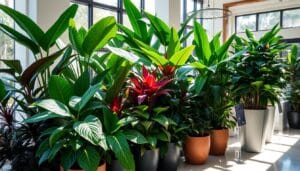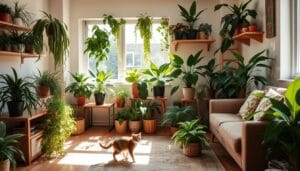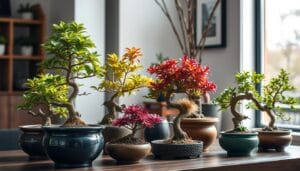Table of Contents
Turning your home into a peaceful oasis is easier than ever, thanks to indoor plants. This guide is perfect for both seasoned plant lovers and beginners. It will show you the best plants to make your home beautiful and improve your health.
We’ll look at plants that clean the air and are easy to care for. These plants can make any room look better and offer many benefits. They can help your health, air quality, and make your home feel like a calm, natural place.

Key Takeaways
- Discover the top indoor plants to transform your living space into a beautiful, nature-inspired oasis.
- Learn about the physical and mental health benefits of incorporating indoor plants into your home.
- Explore a variety of low-maintenance, easy-care indoor plant options for busy homeowners.
- Understand how indoor plants can improve air quality and enhance the overall aesthetics of your home.
- Gain insights into the best indoor plant choices for different lighting conditions and living situations.
Introduction to Indoor Plant Benefits
Adding indoor plants to your home brings many benefits. They improve physical and mental health and clean the air. Explore the world of NASA-approved indoor plants and how they can change your home.
Physical and Mental Health Advantages
Studies show indoor plants greatly benefit our health. They reduce stress, help focus, and lift our mood. Adding these NASA-approved indoor plants to your home is a simple way to live healthier.
Home Aesthetics Enhancement
Indoor plants also make your home look better. They add depth and natural beauty to any room. Try different plants and setups to find the best fit for your home.
Air Quality Improvement
NASA-approved indoor plants also clean the air. They remove harmful toxins, making your home healthier. Adding these plants is a smart way to improve your living space.
“Bringing nature indoors is one of the easiest and most effective ways to improve our health and well-being.”
Best Indoor Plants for Beginners
Discover low-maintenance houseplants perfect for beginners. These easy-care plants are great for new plant owners. They are forgiving and simple to care for, helping you grow a green oasis easily.
There are many options for beginners. From air-purifying plants to tough succulents, here are some great choices:
- Pothos – A trailing vine that’s hard to kill. It grows well in different lights and only needs water sometimes.
- Snake Plant – Known as mother-in-law’s tongue, it’s very tough. It can handle neglect, making it perfect for beginners.
- ZZ Plant – This plant does well in little light and only needs water every few weeks. It’s great for busy people.
- Chinese Evergreen – It has beautiful leaves and can handle different lights. It’s a stunning and easy plant to care for.
- Philodendron – There are many types, from heart-shaped to trailing. They are very forgiving and easy to care for.
Choosing these plants, beginners can easily create a beautiful indoor space. With the right care, these plants will help beginners feel confident in their gardening skills.

| Plant | Light Requirements | Watering Needs | Difficulty Level |
|---|---|---|---|
| Pothos | Bright, indirect light | Water when the top inch of soil is dry | Very easy |
| Snake Plant | Tolerates low light | Water every 2-3 weeks | Very easy |
| ZZ Plant | Tolerates low light | Water every 2-3 weeks | Very easy |
| Chinese Evergreen | Tolerates low to medium light | Water when the soil is partially dry | Easy |
| Philodendron | Bright, indirect light | Water when the top inch of soil is dry | Easy |
“Caring for indoor plants is a rewarding journey that can bring a touch of nature into your home. Start with these low-maintenance options and watch your green thumb grow!”
Low-Light Indoor Plants for Dark Spaces
Bringing nature into dark corners of your home is a challenge. But don’t worry! Many low-light indoor plants can brighten up even the darkest spots. They range from plants for north-facing windows to those that love the humidity of bathrooms.
North-Facing Window Plants
For areas with little natural light, these plants are perfect. They grow well in the soft light of north-facing windows:
- Chinese Evergreen (Aglaonema)
- Snake Plant (Sansevieria)
- ZZ Plant (Zamioculcas zamiifolia)
- Pothos
Bathroom-Friendly Options
Bathrooms with low light and humidity are ideal for some plants. These moisture-loving plants will thrive in your bathroom:
- Philodendron
- Peace Lily (Spathiphyllum)
- Ferns, such as the Boston Fern
- Dracaena
Under-Stair Solutions
Make the space under your stairs green and vibrant. These plants are perfect for the low light:
| Plant | Light Requirements | Unique Features |
|---|---|---|
| Cast Iron Plant (Aspidistra) | Tolerates deep shade | Resilient, low-maintenance |
| Chinese Evergreen (Aglaonema) | Thrives in low light | Vibrant, colorful foliage |
| Dumb Cane (Dieffenbachia) | Prefers partial shade | Large, lush leaves |
With these plants, you can make even the darkest spots bright and green. Turn shadowy areas into lush, green retreats.

Air-Purifying Plants for Better Living
Improving your home’s air quality is now easier than ever. Thanks to air-purifying plants, many of which NASA has approved. These plants can remove common pollutants, making your home healthier.
These air-purifying plants can handle pollutants like formaldehyde and benzene. They also tackle ammonia and xylene. By placing these best indoor plants around your home, you get fresh air and beautiful greenery.
Top NASA-Approved Air-Purifying Plants
- Peace Lily (Spathiphyllum): Known for removing formaldehyde, benzene, and trichloroethylene.
- English Ivy (Hedera helix): Great at getting rid of mold, benzene, and formaldehyde.
- Snake Plant (Sansevieria trifasciata): Makes oxygen at night and cleans pollutants like benzene and formaldehyde.
- Bamboo Palm (Chamaedorea seifrizii): Removes formaldehyde, xylene, and toluene, perfect for clean air.
Adding these NASA approved indoor plants to your home is easy and beneficial. They naturally purify the air, helping you and your family breathe better. This simple step can make your living space healthier.

“Houseplants can play a important role in cleaning the air we breathe, helping to remove harmful pollutants and provide fresher, cleaner air in our homes and offices.” – NASA Clean Air Study
Pet-Friendly Indoor Plant Options
Decorating your home with indoor plants is fun, but think about your pets’ safety. Luckily, many plants are safe for pets and can make your home look great. Let’s look at some of the best indoor plants that are safe for pets.
Non-Toxic Plant Varieties
Choosing the right indoor plants is key. Avoid plants that can harm your pets. Good options include spider plants, calathea, ponytail palms, and Boston ferns. These plants are pretty and safe for your pets.
Safe Placement Strategies
Even safe plants need the right spot. Place them where pets can’t get to them, like high shelves or hanging baskets. This keeps your pets safe from plants.
Alternative Choices for Pet Owners
- If your pets like to chew, try cat grass or catnip. They’re safe and fun for pets.
- Make a special area for pet-safe plants. It’s a fun place for your pets to play and explore.
By picking the right plants and placing them safely, you can make a pet-friendly home. This way, you and your pets can enjoy a beautiful space together.

Tropical Indoor Plants for Statement Decor
Bring the lush, vibrant elegance of the tropics into your home with a selection of captivating tropical indoor plants. These large, eye-catching specimens can serve as stunning statement pieces. They transform any space into a verdant oasis.
From the majestic fiddle-leaf fig to the bold bird of paradise, tropical plants offer a sense of tropical allure. They instantly elevate your interior design. With their large, lush leaves and dramatic forms, these plants demand attention. They are perfect for making a statement in your living room, bedroom, or any high-visibility area of your home.
Incorporating tropical indoor plants into your decor is a surefire way to add a touch of the exotic. It creates a truly unique, nature-inspired ambiance. Whether you opt for a tall, sculptural monstera deliciosa or a colorful bromeliad, these tropical wonders will instantly captivate and transform your space.
Caring for Tropical Indoor Plants
Bringing the tropics indoors does require a bit of extra care and attention, but the rewards are well worth it. Tropical indoor plants generally thrive in bright, indirect light. They prefer consistently moist, humid environments. Be sure to provide the appropriate soil, watering, and humidity levels to keep your tropical beauties healthy and thriving.
| Tropical Plant | Light Needs | Watering | Humidity |
|---|---|---|---|
| Fiddle-Leaf Fig | Bright, indirect | Keep soil moist | 60-80% |
| Bird of Paradise | Bright, direct | Water when top inch of soil is dry | 50-60% |
| Monstera Deliciosa | Bright, indirect | Keep soil consistently moist | 60-80% |
| Bromeliad | Bright, indirect | Water central cup and soil | 60-80% |
By providing the right care, you can enjoy the lush, tropical beauty of these statement-making plants for years to come. Experiment with different tropical indoor plants to find the perfect fit for your home and design style.

Easy-Care Indoor Plants for Busy People
For those with a packed schedule, caring for indoor plants can seem hard. But, there are many low-maintenance houseplants that need little effort. These easy-care indoor plants are perfect for busy people who want to add green to their homes.
Drought-Resistant Options
Succulents and cacti are great for busy plant lovers. They need water only sometimes and can handle neglect. Aloe vera, jade plant, and snake plant are top picks for those who forget to water sometimes.
Set-and-Forget Varieties
For the ultimate in easy-care, choose plants that need almost no care. ZZ plant, Chinese evergreen, and cast-iron plant are perfect. They can handle low light and don’t need much water. Just put them in a good spot and forget about them.
Time-Saving Care Tips
- Choose plants that only need watering every 1-2 weeks.
- Opt for low-light tolerant varieties that can thrive in shaded areas.
- Look for plants that can go for extended periods without needing to be repotted.
- Consider self-watering planters or smart irrigation systems to reduce watering frequency.
With the right low-maintenance houseplants and a few care tips, you can enjoy indoor greenery without stress. Embrace these easy-care plants and turn your space into a lush oasis.

Conclusion
Indoor plants can make your home beautiful and improve your health. There are many types to choose from, like plants that don’t need much light or those that clean the air. Finding the right plant is all about trying different ones and seeing what you like.
Adding the best indoor plants to your home brings many benefits. They can make the air cleaner and your space feel more like nature. With the right care, these plants can turn your home into a green paradise. So, start looking for the perfect plants to make your home a peaceful retreat.
Finding the right indoor plants is a fun and ongoing adventure. Enjoy the process, learn as you go, and let your home flourish with the best indoor plants, indoor plant care tips, and easy-care indoor plants that match your style.
FAQ
What are the benefits of having indoor plants?
Indoor plants improve air quality by removing pollutants. They also boost mental health and add beauty to your home.
What are some low-maintenance indoor plant options?
Succulents, ZZ plants, snake plants, pothos, and peace lilies are easy to care for. They need little water and attention.
Which indoor plants are safe for pets?
Safe plants for pets include African violets, Boston ferns, Chinese evergreens, and nerve plants. Always check if a plant is toxic before bringing it home.
What are the best indoor plants for low-light conditions?
Snake plants, Chinese evergreens, cast-iron plants, and philodendrons do well in low light. They’re perfect for dark corners or north-facing windows.
How can indoor plants improve air quality?
Plants like English ivy, peace lilies, and spider plants clean the air. They remove pollutants like formaldehyde and benzene.
What are some visually striking indoor plant options?
Plants like fiddle-leaf figs, monstera deliciosa, and bird of paradise add a bold touch. They bring a lush, exotic feel to your home.
How can I care for my indoor plants effectively?
To care for your plants, know their specific needs. This includes how often to water, how much light they need, and their humidity preferences. Regularly check and adjust your care to keep your plants healthy.





